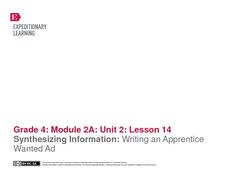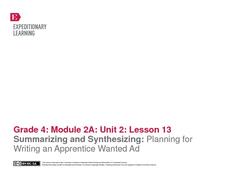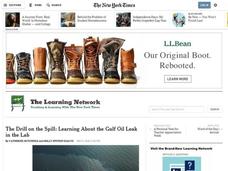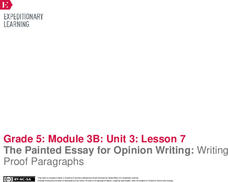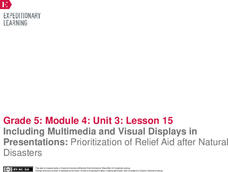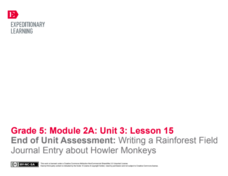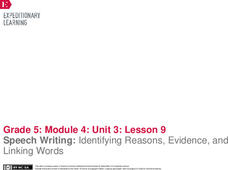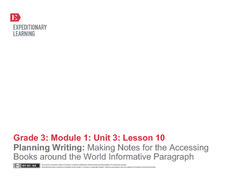EngageNY
Listening Closely and Taking Notes in Expert Groups: Colonial Trade Podcast
The twelfth instructional activity of this unit builds on the skills developed in the previous instructional activity, as fourth graders continue their quest to become experts on colonial trade by listening to interviews with historical...
EngageNY
Listening Closely and Taking Notes: Colonial Trade Podcast About the Wheelwright
Voices from the past. Young scholars listen to a podcast interview with a historical re-enactor as they continue their research in the eleventh instructional activity of this unit on colonial trade. Applying their close reading skills,...
EngageNY
Synthesizing Information: Writing an Apprentice Wanted Ad
Fourth graders view examples of help-wanted ads as they plan and create their own writing in the fourteenth instructional activity of this unit on colonial trade. The engagement of the class is captured when the teacher shares an actual...
EngageNY
Summarizing and Synthesizing: Planning for Writing an Apprentice Wanted Ad
In instructional activity 13 of this unit on colonial trade, young researchers learn about apprentices as they prepare to write help-wanted ads for the specific trade they have been researching. To begin, the class listens closely as the...
EngageNY
Developing Reading Fluency: Beginning the End of Unit 2 Assessment
Third graders continue to develop their reading fluency in preparation for their assessment in the tenth lesson plan of this unit. Young readers are provided with a short passage on Helen Keller, which they use while working in pairs...
EngageNY
Developing Reading Fluency: Selecting a Text and Practicing Reading Aloud
Young readers continue to strengthen their fluency skills with a text of their choosing. The teacher first engages the class with an audio recording or read-aloud of a short poem, modeling for children how to read fluently. Next it's...
Curated OER
On the Trail of the Hudson's Migratory Fish
Using data related to the fish in the Hudson River area, learners calculate distance, elapsed time, and growth. They learn about migratory fish, the life cycle of a fish, analyze a map, and answer questions.
Curated OER
The Past Is Gone, But Not Forgotten
Students examine the role of historic sites in preserving the past, and use a NY Times article about a preserved 19th century farm as a springboard for discussion about the conservation of other historic sites and research about historic...
Curated OER
The Drill on the Spill: Learning About the Gulf Oil Leak in the Lab
Students research the Gulf of Mexico oil spill and complete experiments to study the effects of oil spills. In this oil spill lesson, students read the NY Times feature on the gulf oil spill. Students visit various links to research the...
EngageNY
Revising: Strong Conclusions for My Accessing Books Around the World Informative Paragraph
It's important that writers leave their readers with a strong and satisfying conclusion. Help your young writers develop the skills to compose a concluding sentence with the steps outlined here. After class members have had a chance to...
EngageNY
Revisiting Big Metaphors and Themes: Revising and Beginning to Perform Two-Voice Poems
Now that your class has read all of Esperanza Rising, take the time to tackle big metaphors and themes. Pupils will participate in an activity called Chalk Talk, in which they circulate around the room in small groups and add comments to...
EngageNY
Taking Notes Using a Graphic Organizer: Inferring About Work and Play in Colonial America
What was life like in colonial America? Follow this lesson and your pupils will find out what people in colonial times did for work and for fun. Ask learners to compare and contrast the two texts and explain what the reading helped them...
EngageNY
Independent Reading: Building The Power of Stamina
The Incredible Book-Eating Boy is read aloud to young readers, and the story is discussed. Then, the lesson goes into how to build up one's reading stamina. The class brainstorms ways that they can build up their stamina such as: staying...
EngageNY
The Painted Essay for Opinion Writing: Writing Proof Paragraphs
It's time to proof read! Pupils read and analyze proof paragraphs from a model essay. They then practice writing their own proof paragraphs to express an opinion about offshore oil drilling.
EngageNY
Peer Critique and Revision: Editorial Essay
Get those red pens ready! Using the Peer Critique protocol, scholars provide and receive feedback on their editorial essay drafts. They then use class time to work on revisions.
EngageNY
Including Multimedia and Visual Displays in Presentations: Prioritization of Relief Aid after Natural Disasters
It's time to put the plan into practice. Using their plans from the previous lesson plan, scholars create multimedia and visual displays for their opinion speeches. Next, they watch videos of speeches and use a presentation rubric to...
EngageNY
Final Performance Task: Critique and Revision, Part II
Stop ... grammar time! Pupils complete worksheets to practice using the correct verb tense and identify correlative conjunctions. Next, scholars apply their new grammar skills to edit their draft opinion speeches.
EngageNY
Writing, Critique, and Revising: Two-Voice Poems (Chapter 14: "Las Ucas/Grapes")
Continue work on the two-piece poem that compares two characters from Esperanza Rising. Give class members a few minutes to finish their drafts. After they have a complete product, model how to critique and edit the poems with one group....
EngageNY
How to Write Like a Scientist in the Field: Introduction to the Elements of Field Journals
It's time to start journaling. Scholars look at examples of science field journals. They work in pairs to examine and complete a note catcher about a field journal. They then add to an anchor chart by discussing the different features...
EngageNY
End of Unit Assessment: Writing a Rainforest Field Journal Entry about Howler Monkeys
Give me more details. Scholars complete an end of unit assessment by creating an information text box to go with their field journal entries about howler monkeys. Learners use the class time to work independently.
EngageNY
Mid-Unit 3 Assessment, Part I: Short Constructed Response and Organizing Notes for a Public Speech
It's time to put pen to paper. Scholars complete the first part of the mid-unit 3 assessment, writing a short constructed response about international aid following a natural disaster. Next, pupils use informational texts and note...
EngageNY
Speech Writing: Identifying Reasons, Evidence, and Linking Words
Enjoy the view. Scholars continue viewing a video of an opinion speech, this time identifying the supporting evidence the speaker employs. After watching, they work in small groups on their shared writing projects, crafting a body...
EngageNY
Planning Writing: Making Notes for the Accessing Books Around the World Informative Paragraph
Encourage your young writers to thoughtfully plan and organize their work. First, model how this is done and vocalize your thought process as you work. Next, create a class list of strategies that they can use during independent writing...
Curated OER
The Appliance Explosion
Students explain why the number of appliances used today differs greatly from the number used previously. They construct a bar graph to show changes in appliance use over a period of time. They also list appliances that could be eliminated.
Other popular searches
- Ny Times, Heart Attack
- Ny Times Just War
- Mitosis Meiosis Ny Times
- Digestive System Ny Times
- Ny Times Articles
- Ny Times Learning
- Ny Times Economy
- Tsunami Ny Times
- Ny Times Lesson
- Ny Times Heart Attack
- Ny Times Ice Cream
- Ny Times Learning Network




